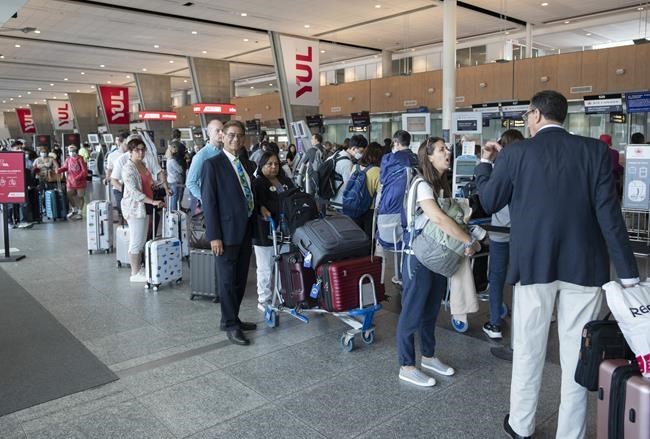OTTAWA — Most Canadians believe the country is in a recession and that prices are going to continue to rise for the foreseeable future, according to a new poll.
A wide-ranging survey by Leger asked Canadians and Americans about issues including travel plans, airport delays and inflation.
More than 80 per cent of Canadian respondents said they believe prices will keep going up, and 59 per cent say they think Canada is in an economic recession.
That's likely not good news for economists or business owners, said Leger vice-president Andrew Enns.
"It's sort of a proxy question for how you feel about the economy," he said.
"Between that and the rising inflation and the tightening of household budgets, that probably is not going to be something that's going to encourage much consumer spending."
The outlook was similarly bleak south of the border, where 64 per cent said the U.S. is in a recession, while 19 per cent said they didn't know. But only 66 per cent of Americans feel prices will continue going up, and 16 per cent said things are starting to get better.
The online survey was completed by 1,538 Canadians and 1,002 Americans between July 8 and 10. It cannot be assigned a margin of error because online polls are not considered truly random samples.
Flight cancellations, delays and long lineups have 53 per cent of Canadian respondents concerned about airport travel, while 43 per cent said they're not concerned and only three per cent said they were unaware of the problems.
A similarly small proportion, four per cent, said they weren't aware of long lineups and delays in getting passports — likely evidence of how prominent both issues have been in the news in recent months.
Despite the many news stories about passport delays, less than half of Canadians polled said they were concerned about the issue, while 50 per cent said it's not concerning.
"I think to be really sort of seized by that issue, you have to either have a trip coming up and probably also need to be looking at your passport expiration date," Enns said.
More than half of Canadians who took the survey said they plan to travel within their own province, and another 28 per cent said they will travel within Canada. Just over a quarter said they'll be heading abroad, with 16 per cent of travellers going to the U.S.
American respondents weren't asked about the passport issue, but 45 per cent of them said they were concerned about travel issues. Another 13 per cent said they weren't aware of the problem.
Just 18 per cent said that's caused them to significantly change their vacation plans. People under 35 were more likely to say they're changing their plans, and also more likely to be planning to travel overseas.
Enns said that number — nearly one in five — won't sit well with the tourism sector.
"If you're the tourism operator, running the bed and breakfast or the resorts, and finally we've got our first summer where we're free and clear of COVID, you probably aren't thrilled to see some of these stories," he said.
There seems to be general agreement about what the problem is, with 68 per cent of Canadians and 54 per cent of Americans saying they think staffing shortages are to blame.
But 38 per cent of American respondents say it's the airlines that are short-handed, while 43 per cent of Canadians think it's the airports themselves.
A similar proportion — 18 per cent in Canada and 17 per cent in the U.S. — laid the blame on government COVID-19 restrictions.
People from the Prairies were more likely to believe the pandemic rules are the problem, and those from Atlantic Canada and Quebec were more likely to blame airports.
This report by The Canadian Press was first published July 12, 2022.
Sarah Ritchie, The Canadian Press




